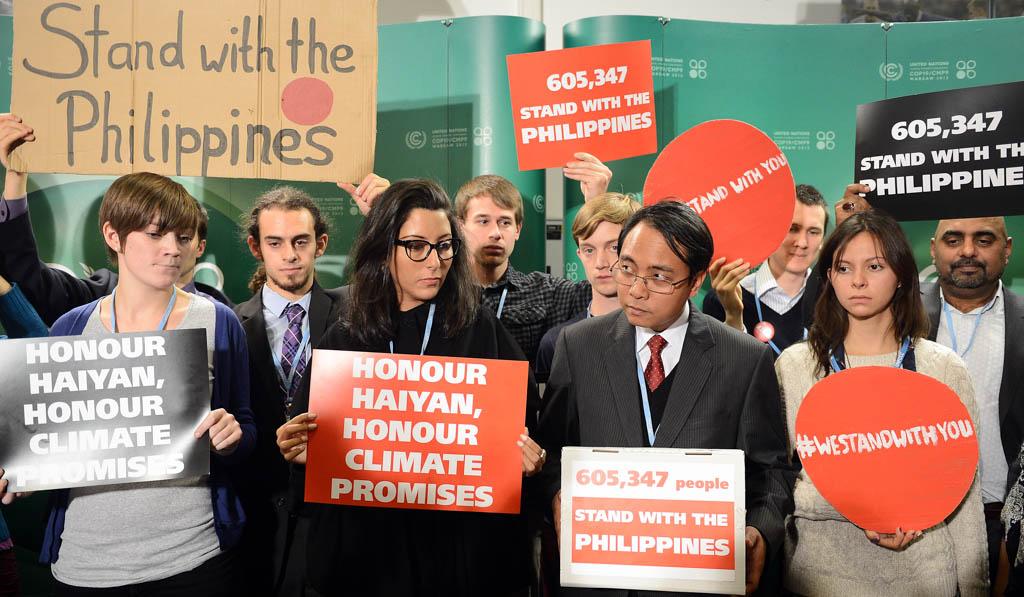Talking Peace: Australia’s failing ‘t-shirt diplomacy’ on climate change
The Philippines’ head negotiator Naderev Sano (2dR) and supporters hold banners reading “605,347 people stand with the Philippines” and “Fund solutions not polluters” while attending the United Nations Climate Change Conference COP 19 on November 19, 2013 in Warsaw. Sano delivers a 590,000+ person campaign calling for climate action directly to the climate negotiations in an unprecedented step for a climate negotiator and calls on UN countries to take urgent and bolder action to tackle climate change.
The United Nations climate talks, happening in Warsaw, Poland through Friday, were interrupted early Wednesday as the 132 participating countries staged a 4 a.m. walkout.
Australia was reportedly the target, the result of its delegates' “t-shirt diplomacy.” Australian delegates, officials said, refused to take negotiations seriously by dressing casually, “giggling,” and dragging their feet on an international mechanism intended to help developing nations rebuild after environmental disasters. Underneath it all? A conflict of countries with great wealth disparities between them about how responsibility for climate change and its effects should be divided up.
Here’s a closer look:
AUSTRALIA (in Warsaw)
Australia may have damaged its reputation Wednesday when the country’s representatives at the Warsaw climate change talks behaved “disrespectfully” and reportedly “wore t-shirts,” sparking a 4 a.m. walkout.
The G77—a collection of 132 countries that come together to “pursue common goals and develop leverage in United Nations deliberations”—and China have taken offense at Australia’s “hard-line tactics” and “bad behavior” that interrupted important negotiations concerning an international loss and damage mechanism, which would call on developed nations to assist developing nations in the event of environmental catastrophe.
The US and others have been negotiating at a technical level in good faith. It broke down last night because of the Australians,” said Saleemul Huq, a G77 scientific advisor. "This is a serious issue. We are talking about life and death, people are dying from Typhoon Haiyan, we’ve got people on hunger strike here. You don’t trivialize these issues… It is just not done.”
Some observers, however, have said that anger aimed at Australia is misdirected because it is not only in the company of other developed nations — like Canada and Japan — but some developing countries are also taking equally rigid stances, fearing they could be “drawn into committing to their own emission reduction targets.”
But Australia did not always stand against positive, collective brainstorming about climate change. In fact, under the leadership of the new prime minister, Tony Abbott, the country has recently gone back on its previously more constructive approach to negotiations. The prime minister's government has reportedly dismantled Australia's own climate policies and institutions.
Since coming to power two months ago, the Australian Broadcasting Company reported, the administration has repealed the carbon tax "and its associated measures for reducing greenhouse gas emissions, such as the Climate Change Authority," the Clean Energy Finance Corporation, and the Climate Commission, which is responsible for "explaining climate science to the public."
The government has instead decided to forge onward with its Direct Action Plan, which calls for Australia to reduce its emissions by five percent "within its allocated budget."
Economists and environmental activists, however, say the plan won't reach its goal, and upset delegates at the climate talks say five percent is not enough, and the government should be held to its former promises.
“We are mindful that the Australian government has recently changed, and has a different policy,” Alf Wills, lead negotiator for South Africa told RenewEconomy. “What is disappointing for us is the comment made by the new prime minister that Australia will only do minus 5 percent. For us it just reinforces the concept that these numbers need to be internationally legally binding, because if governments change, can they just unilaterally change their international commitments … on the basis that they say that wasn’t us, that was someone else?”
Loss and damage is perhaps the most critical issue up for negotiation, especially following the impact of Typhoon Haiyan on the Philippines, and it is a particularly sensitive issue for developed nations that fear being required to compensate underdeveloped countries — which are the most affected by climate change — for past emissions.
Australia, which is also happens to be leading the 2014 G20 summit, seems to be the catalyst for a larger frustration with uncooperative, wealthier nations, according to Oxfam's Tim Gore.
The decision to abandon the talks on compensation for loss and damage, he said, "highlights the level of exasperation there is with rich countries at these talks — particularly the Australian delegation… The question now is how ministers will stop the rot spreading elsewhere."
The story you just read is accessible and free to all because thousands of listeners and readers contribute to our nonprofit newsroom. We go deep to bring you the human-centered international reporting that you know you can trust. To do this work and to do it well, we rely on the support of our listeners. If you appreciated our coverage this year, if there was a story that made you pause or a song that moved you, would you consider making a gift to sustain our work through 2024 and beyond?
